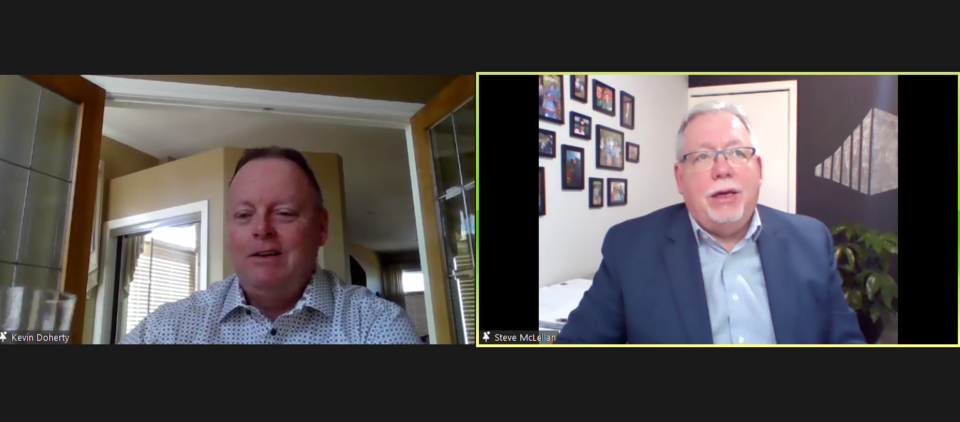Following the release of the provincial budget in the Legislature on April 6, the Saskatchewan Chamber of Commerce hosted former Minister of Finance Kevin Doherty for a conversation about the provincial budget process.
Doherty, now the managing director at Prairie Sky Strategy, joined chamber CEO Steve McLellan on April 7 for an informational session with chamber members.
“I watched with interest yesterday [as] Minister [Donna] Harpauer delivered her budget and what caught my eye is that this is a spending budget,” said Doherty, beginning the talk.
He said that 75 per cent of the spending allocation in the 2021-22 budget is directed toward healthcare, education, social services and the justice sector, which he noted is not out of place when compared to other provincial budgets.
In addition to the record spending outline by Harpauer, the estimated deficit in this year’s budget is also at a record-high $2.6 billion, but Doherty explained that a large deficit typically comes with a spending budget.
“When things are going well, finance ministers take too much credit and when they’re going bad, finance ministers take too much [heat],” said Doherty.
Spending plans are created during a lengthy process that involves a treasury board, the various ministries, cabinet ministers and the premier. Investment in provincial assets, including infrastructures like hospitals or highways, results in debt that finance experts consider “good debt.”
The key to remember, said Doherty, is that government officials are keeping tabs on revenue lines throughout the fiscal year and adjusting spending allocations in response to quarterly reports.
Serious changes in the economic climate — including decisions made by outside countries — can have a big impact, and Doherty noted that changes in revenues will be the milestones to watch over the next year.
Doherty also predicts that the large spending budget outline this year will decrease in the following years, as less funding is required to address the pandemic. But, he noted, governments also have difficulty cutting funding once it has been provided.
“The difficulty in managing a budget in politics is that nobody wants their services reduced, or pay more, but then they get mad at you when you’re running deficits,” said Doherty. “People want more spending, particularly in their area of concern, but they don't want cuts that affect them.”
Announcing a big deficit with a budget report can cause panic to rise, said Doherty, but often the realistic impacts of spending and cuts are complicated and best explained by a finance expert.
Public criticisms of government finance plans are sometimes too critical, said Doherty, as the decision process involves a lot of continuously moving parts within government structures.
“It's difficult in a four-year time frame to sit down and have a non-partisan discussion about issues without it becoming partisan,” said Doherty. “The complexity of the problems that all governments are dealing with, and the simplistic solutions that people demand. . . we don't have the time to sit down and have the discussions [needed] to resolve those.”




